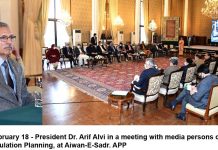The Government of Pakistan’s Higher Education Commission (HEC) celebrated the 16th anniversary of the Merit and Needs-Based Scholarship Program (MNBSP), which is administered in partnership with the United States Government through the U.S. Agency for International Development. Since 2004, USAID has worked with HEC to provide equitable access to higher education and increase enrollment at Pakistani universities through merit scholarships for economically disadvantaged students. MNBSP has granted more than 5,300 scholarships in total, and more than half of the scholarships have been awarded to female students. Recipients demonstrate strong academic skills and financial need, and the majority live in remote rural areas. The MNBSP awards scholarships to study agriculture, engineering, medical sciences, and social sciences. Recipients are eligible to study at 30 private and public partner universities a cross the country. “USAID is proud to partner with HEC in our shared desire to bring more highly-skilled and well-educated young Pakistanis into the workforce,” said USAID Mission Director Julie Koenen. HEC Chairman Dr. Tariq Banuri thanked USAID and noted that USAID’s Merit and Needs-Based Scholarship Program is the model for the Government of Pakistan’s Ehsaas Undergraduate Scholarship Project, which also provides financial aid to disadvantaged students.
متعلقہ مضامین
-
Indian govt’s ruthless persecution of minorities echoes in UK parliament
-
Eradication of criminals top priority of police: IGP
-
In respect of a noble institute
-
PDM destined to face failure, disgrace and humiliation: Shibli
-
Will RSS infiltrate AJK?
-
Antiquities DG refutes media reports regarding Makli
-
Man arrested from Ferozewala for displaying weapons on TikTok
-
KP CM directs DCs to implement strategy for good governance
-
‘Bilawal makes a fool out of Fazl’, Sheikh Rashid mocks PDM rally
-
SC dismisses bail plea of Hamza Shahbaz in money laundering case
-
Buzdar slams opposition for trying to divide nation
-
Sharifs furious due to impending repercussions of Broadsheet: Murad














